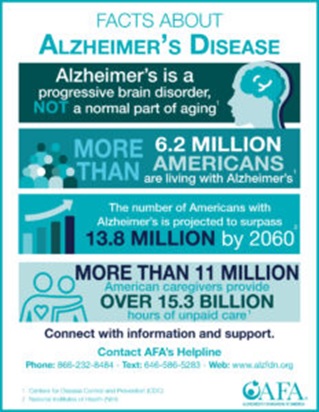November Is Alzheimer’s Awareness Month
The month of November is Alzheimer’s awareness month. It’s a time to remember and spread awareness about the tragedy of Alzheimer’s disease and how it impacts the lives of 6.2 million American people who live with it, and four to five times that number of family members who know the pain and anguish of caring for a loved one with Alzheimer’s disease. According to The Alzheimer’s Foundation of America, 13.8 million Americans are projected to suffer from the disease by the year 2060. And more than 11 million people, provide over 15.3 billion hours of unpaid care for their relatives afflicted with this debilitating illness.

The Alzheimer’s Association tells us that, “Alzheimer’s is not a normal part of aging. The greatest known risk factor is increasing age, and the majority of people with Alzheimer’s are 65 and older. Alzheimer’s disease is considered to be younger-onset Alzheimer’s if it affects a person under 65. Younger-onset can also be referred to as early-onset Alzheimer’s. People with younger-onset Alzheimer’s can be in the early, middle or late stage of the disease.” In fact for decades Alzheimer’s was known alternatively as “Senile Dementia” and has long been associated culturally with advanced age, being seen as a regrettable but natural occurrence.
However, this is not the case. Alzheimer’s is a progressive, degenerative disease, a disease that worsens significantly over time. Over the initial stages, most patients lose their ability to retain memory in mild fashion, it proceeds very gradually, until it becomes clear that new memories are frequently not being created in their minds. As it moves into later stage Alzheimer’s the individuals lose the capacity to converse or respond to changes in their surroundings entering a distant, detached state. On the average, an Alzheimer’s patient lives from four to eight years after being diagnosed. In outlying cases some patients may endure as long as twenty-years as their mental faculties gradually diminish until rapidly collapsing.
The Progressing Symptoms Of Alzheimer’s Disease
The fact that the human body ages, is eternal, it’s immutable, inexorable and unstoppable. The human brain ages just as the rest of the body does. Many people will notice that their thinking is a little slower with age, some will not. Many young people experience issues with memory every day, and it’s often accepted as a mere product of age. The serious types of memory loss, confusion, or changes in the way the mind processes stimuli are in fact an indication that the brain like any other part of the body…is beginning to fail.
The Alzheimer’s Association tells us,
“Alzheimer’s changes typically begin in the part of the brain that affects learning. As Alzheimer’s advances through the brain it leads to increasingly severe symptoms, including disorientation, mood and behavior changes; deepening confusion about events, time and place; unfounded suspicions about family, friends and professional caregivers; more serious memory loss and behavior changes; and difficulty speaking, swallowing and walking.”
At this point though, microscopic changes have already been affecting the brain for months if not years. Scientists and physicians believe that in Alzheimer’s patients, fragments of protein building up in the spaces between nerve cells called amyloid plaques and tangles of the twisted fibers of another different protein called “tau” build up within the cells. While these researchers do not yet fully understand the roles that these proteins play in the development of Alzheimer’s, many do assert that these changes play a major role in blocking communication between the cells and disrupting the processes that keep them alive.
In June of 2021, the US Food and Drug Administration announced the approval of Aduhelm (aducanumab) for the treatment of Alzheimer’s.
“Alzheimer’s disease is a devastating illness that can have a profound impact on the lives of people diagnosed with the disease as well as their loved ones,” said Patrizia Cavazzoni, M.D., director of the FDA’s Center for Drug Evaluation and Research. “Currently available therapies only treat symptoms of the disease; this treatment option is the first therapy to target and affect the underlying disease process of Alzheimer’s. As we have learned from the fight against cancer, the accelerated approval pathway can bring therapies to patients faster while spurring more research and innovation.”
While there is no cure for Alzheimer’s and drugs for the treatment of the disease such as Aducanumab have only recently been approved, Apotheca Wholesale Pharmaceuticals is well equipped and ideally suited to supply pharmacies and practices with a variety of medications for managing Alzheimers. We have all of the qualities you’re looking for in a Pharmaceutical distributor and we’re in this together.
Contact us today at Customerservice@apothecainc.com or call us at 602-252-5244.
